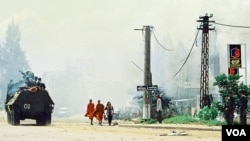It has been 19 years since the Cambodian People’s Party seized control of the country in a violent coup.
On Wednesday, two opposition parties — the Cambodia National Rescue Party (CNRP) and the Khmer National United — held separate commemoration services in Phnom Penh to mark the coup, which was led by Prime Minister Hun Sen.
The clashes in July of that year saw Hun Sen oust his co-premier, Norodom Ranariddh, with dozens killed and disappeared in the violence.
Kem Sokha, the CNRP’s deputy leader, made a rare public appearance at a religious event at the party’s headquarters after keeping largely out of the public eye for a month since an attempt was made to arrest him.
He called on people to learn the lessons of the coup and not to take revenge on one another. “Non-violent solutions are the only way. No revenge, no violence, we only wish for peace and the stability,” he said.
More than 100 people were killed in the 1997 coup, many of whom were commanders or soldiers loyal to Prince Norodom Ranariddh, the then co-prime minister, and Funcinpec, the royalist political party. They were either killed in fighting in Phnom Penh, or extrajudicially executed in the coup’s aftermath.
Nhek Bun Chhay, president of the Khmer National United Party and the military commander who led royalist forces during the 1997 coup, told VOA Khmer earlier this week that mistrust among politicians at that time created the bloodbath and led to instability.
Cambodian People's Party spokesperson Sok Eysan refused to call the fighting a coup, claiming instead that the royalists were arming themselves for a military takeover and were defeated in a preemptive strike.
“Prince Norodom Ranariddh created a mistrustful friendship between the co-premier [and the premier]," he said. "He bought weapons and also brought in the Khmer Rouge to Phnom Penh; therefore, [Prime Minister] Hun Sen had to crack down to maintain stability and peace.”
Eysan added that the government was ready to act now against any attempts to overthrow Hun Sen.
This report was produced in collaboration with VOA's Khmer Service.











